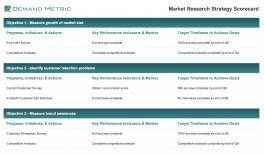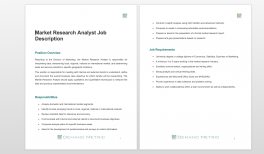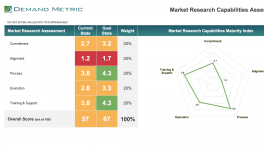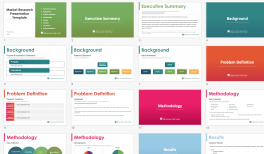In a January & February 2014 study sponsored by SurveyGizmo, Demand Metric partnered with the Marketing Research Association (MRA) to provide a unique view of marketing research from two perspectives.
Marketing Research Benchmark Report
Resource Overview
Related Resources
Executive Summary
Marketing is involved in a lot of big decisions, many of them involving risk: whether to enter a new market, how to respond to competitive pressure, if a new product launch makes sense or what services to offer. Ideally, these decisions are driven by data, and quite often that data is the product of research. Marketing research can help mitigate risk, and while research conclusions themselves don’t make decisions, decision-makers value having research to guide them.
The marketing organization is often responsible for conducting the research that influences many of these decisions. Housing this responsibility in the marketing organization seems logical given the nature of the decisions the research influences. However, “marketing” and “marketing research” are not interchangeable functions. While they are related, even a brilliant marketing team isn’t necessarily equipped to properly conduct marketing research. There’s simply too much at stake for marketing to lead research efforts and draw conclusions based on flawed methods and faulty assumptions. This is not to say that the marketing organization can’t conduct marketing research effectively, but does it do so?
In a study sponsored by SurveyGizmo, Demand Metric partnered with the Marketing Research Association (MRA) to provide a unique view of marketing research from two perspectives. The first is from the perspective of the marketing community – CMOs, vice-presidents of marketing, directors of marketing and their teams that have marketing research on their list of responsibilities. The second view comes from corporate marketing researchers who are members of the MRA whose focus and specialty is marketing research.
As this report will reveal, there are differences in how these two groups approach conducting marketing research. By comparing and contrasting the focus, methods, tools, importance and capabilities between these groups, marketers will have data and parameters to help them become more effective marketing researchers.
Table of Contents
- Introduction
- Executive Summary
- Marketing Research's Importance & Focus
- Initiating & Conducting Research
- Methods & Tools
- Education, Capabilities, Credibility & Impact
- Challenges & The Future of Research
- Analyst Bottom Line
- Acknowledgements
- About SurveyGizmo
- About Demand Metric
- Appendix A - Survey Background
- Appendix B - New Tools Used in the Last Year
Research Methodology
The Demand Metric 2014 Marketing Research Landscape study was administered online during the period of January 30, 2014 through February 21, 2014. Separate but identical surveys were administered to two populations: the Demand Metric marketing community and the Marketing Research Association membership. Members of the Demand Metric marketing community contributed 142 complete or usable partial responses. MRA corporate marketing research members contributed 165 complete or usable partial responses. The survey data was analyzed using IBM SPSS statistical analysis software to ensure validity.





